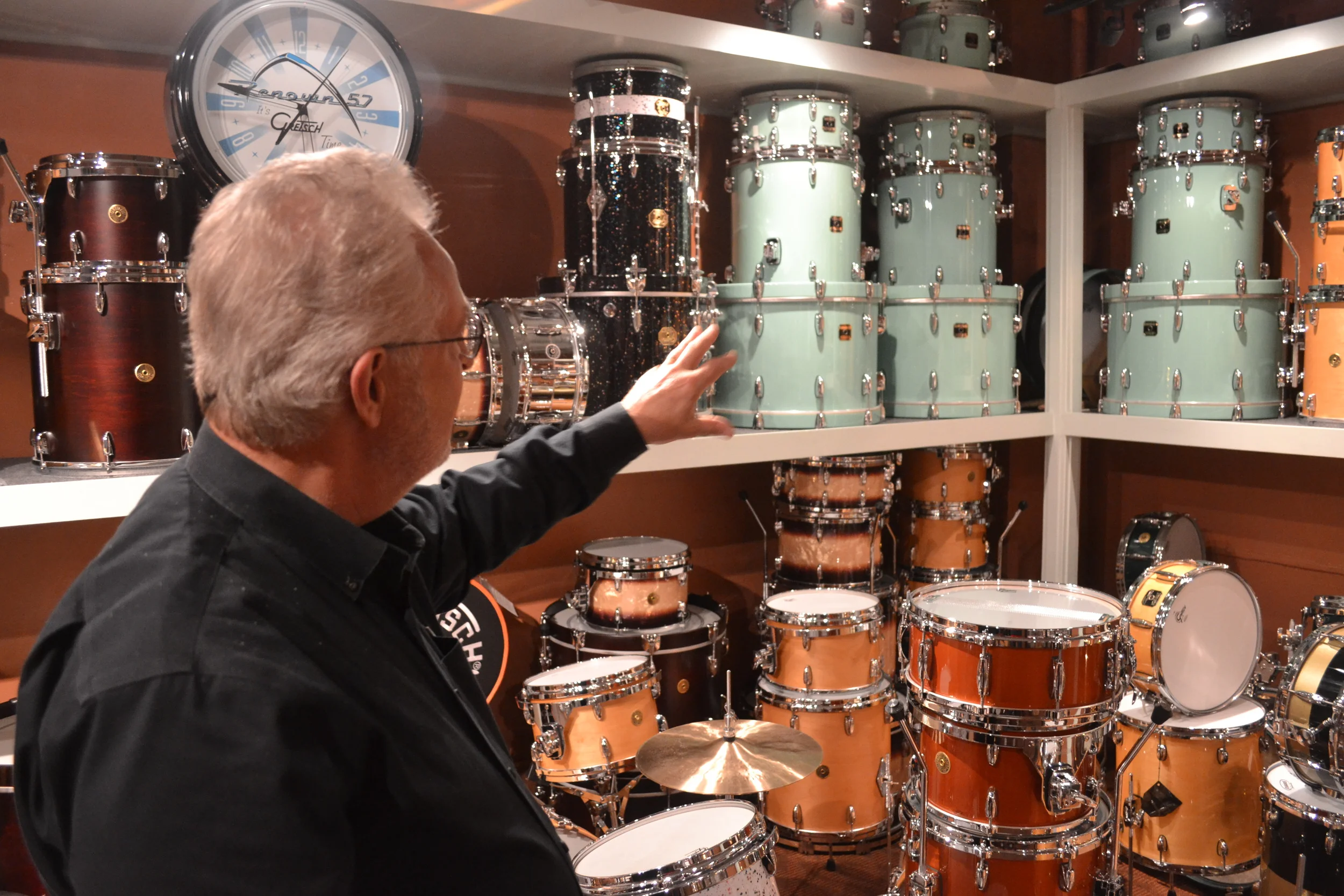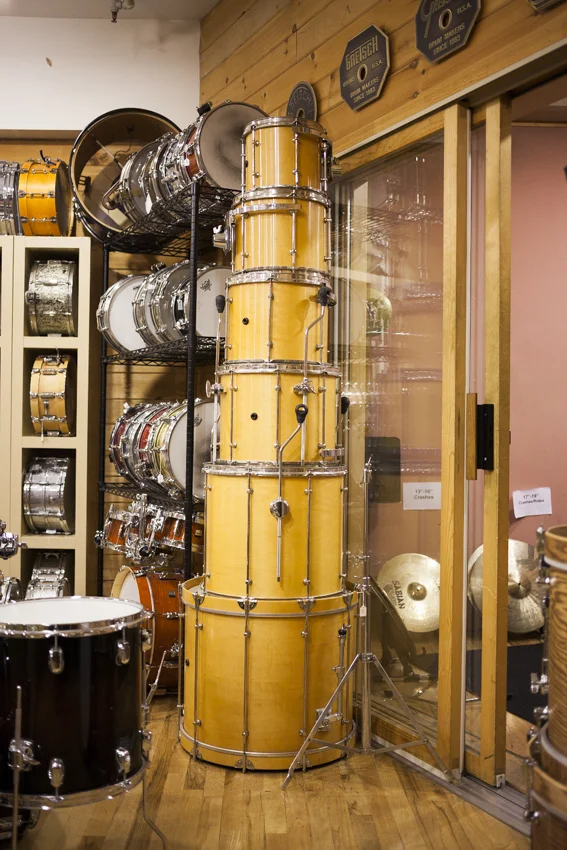

























Your Custom Text Here
“I’ve a story for you.” Steve’s looking over the top of his glasses and gesturing towards a yellow drum set in the corner of his shop. “That’s the most valuable set we have, and it almost ended up as landfill.” He relays a story involving Louie Bellson, Sammy Davis Jr. and a debt to the IRS in excess of two million dollars, a tale that has all the hallmarks of a convincing screenplay.
Occupying the third and fourth floors of a building that overlooks Times Square, the crowds in the street below seem largely unaware of the shop’s existence. This is likely because Steve’s shop is somewhat difficult to find. On what was by no means my first visit, still I found myself stood on 7th Avenue, squinting gingerly through a once translucent door and into a small, darkened lobby. There’s no shop front, just a small elevator bank and a sign that reads “Thai massage: floor two.”
Still, Steve Maxwell Vintage and Custom Drums has a reputation. The expansive collection of vintage, historical and custom kits and cymbals is, for many, an international attraction. Whilst packed wall-to-wall with equipment that is, more often than not, older than most customers, the shop is much more than a show room. It’s a successful business operating in a climate where many have been left unable to compete due to pressure from online retailers.
Out of Steve’s office window, a 20-foot high advertisement for a video game that recently became the fastest selling entertainment product in history is visible. Two blocks to the south there are large, bright billboards on buildings that are attempting to sell expensive cameras to people who quite obviously already have them. The arching golden logos of multibillion-dollar companies who have, traditionally, had questionable ethical orientations are prominent. This is an area of the city where land value is cripplingly high which makes, provisionally, Maxwell’s existence and financial viability seem questionable. Music stores – the independent ones at least - have rarely been heralded as purveyors of untold wealth. Steve’s an astute businessman with a detailed knowledge about the market in which he operates and the products he sells. He’s also very personable with a genuine passion for vintage drums. We sat down to talk about the economics of owning a shop and what it takes to stay afloat.
Read the full article in Issue Five >
Copyright © The Drummer’s Journal 2014
The proprietors and contributors to The Drummer’s Journal have asserted their right under the Copyright Designs and Patens Act 1988 to be identified as the owners and authors of this work.
“I’ve a story for you.” Steve’s looking over the top of his glasses and gesturing towards a yellow drum set in the corner of his shop. “That’s the most valuable set we have, and it almost ended up as landfill.” He relays a story involving Louie Bellson, Sammy Davis Jr. and a debt to the IRS in excess of two million dollars, a tale that has all the hallmarks of a convincing screenplay.
Occupying the third and fourth floors of a building that overlooks Times Square, the crowds in the street below seem largely unaware of the shop’s existence. This is likely because Steve’s shop is somewhat difficult to find. On what was by no means my first visit, still I found myself stood on 7th Avenue, squinting gingerly through a once translucent door and into a small, darkened lobby. There’s no shop front, just a small elevator bank and a sign that reads “Thai massage: floor two.”
Still, Steve Maxwell Vintage and Custom Drums has a reputation. The expansive collection of vintage, historical and custom kits and cymbals is, for many, an international attraction. Whilst packed wall-to-wall with equipment that is, more often than not, older than most customers, the shop is much more than a show room. It’s a successful business operating in a climate where many have been left unable to compete due to pressure from online retailers.
Out of Steve’s office window, a 20-foot high advertisement for a video game that recently became the fastest selling entertainment product in history is visible. Two blocks to the south there are large, bright billboards on buildings that are attempting to sell expensive cameras to people who quite obviously already have them. The arching golden logos of multibillion-dollar companies who have, traditionally, had questionable ethical orientations are prominent. This is an area of the city where land value is cripplingly high which makes, provisionally, Maxwell’s existence and financial viability seem questionable. Music stores – the independent ones at least - have rarely been heralded as purveyors of untold wealth. Steve’s an astute businessman with a detailed knowledge about the market in which he operates and the products he sells. He’s also very personable with a genuine passion for vintage drums. We sat down to talk about the economics of owning a shop and what it takes to stay afloat.
Read the full article in Issue Five >
Copyright © The Drummer’s Journal 2014
The proprietors and contributors to The Drummer’s Journal have asserted their right under the Copyright Designs and Patens Act 1988 to be identified as the owners and authors of this work.